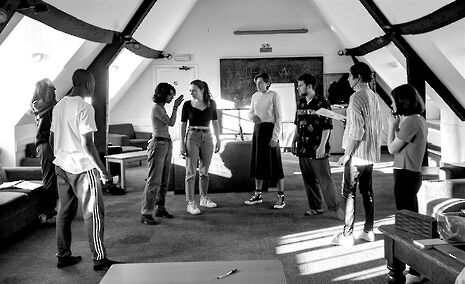Coriolanus preview: ‘compelling in its intimacy’
A stripped-down production of Shakespeare’s Coriolanus comes to the Corpus Playroom, focusing on the ensemble’s bodies and voice

I sit down in the Emmanuel Old JCR, ready to see some Shakespeare in rehearsal. For five minutes, though, I do not hear Shakespeare; I hear an extended debate about the most effective way of pronouncing ‘ta’, and that same sound repeated rhythmically as the four actors in front of me practice a scene transition. The amount of thought that the team puts into this, the discussions about impetus and debates over timing, is surprisingly extensive given that they conclude it does not have to be ‘right’ or polished. In fact, this is very much the vibe of the entire rehearsal; the team here has not set out to make a show that is particularly slick or self-consciously practiced, but one that is organic. This production may be rough around the edges, but it is deliberately so, and it feels all the more real for it.
When they run the whole scene, I can see how this approach works: Adam Mirsky delivers the monologue as Coriolanus with an authenticity that is refreshing. Moreover, this does not feel unpolished at all; it feels like the actors understand their roles, which makes understanding the play as a whole easier too. Shakespeare can be hard to translate for a modern audience; getting to grips with the text to the point where it can be delivered naturally is no easy task. Mirsky, however, has done it here. When I talk to the two of the three directors present – Shimali de Silva and Will Maclean – it becomes clear that this was one of their main aims in the rehearsal process. This is not about creating a production that is choreographed or overly solidified, but fluid and dynamic.
Coriolanus is removed in two senses – firstly, the Renaissance language and secondly, the depiction of a classical Roman setting. Yet, the team hopes that their common investment in the story will negate both levels of remove, allowing the audience to connect to Shakespeare’s Rome precisely because the ensemble connects to it so clearly. They want to bring out the “raw energy” of the text, and to keep it raw; after all, this is a play which uses primal means to tell a charged, “highly political” story.
It is clear that the team has spent a long time digesting the text with which they are working. The division of parts means each of the performers has had roughly a sixth of the entire play to learn and forcing them to get to grips with that much of the text has encouraged them to become invested in the play as a whole. De Silva reckons that “they all have a stake in almost every key event in the play, because they are all involved in so much of it”, and it is this involvement that engenders the high stakes of each performance which the directors feel the production has come to have. Negotiating the multiple registers of Coriolanus is undoubtedly challenging, but the team have worked hard to understand the text in their own way, meaning they each have their own responses to draw on, and their own emotions to bring to the production.
It is a bold choice to place six people on the small Corpus stage with no set, props, or gimmicks, and let them create the vast settings of one of Shakespeare’s most peopled plays. There are very few effects, beyond those created by the bodies of the actors themselves. This is a stripped production, reliant on multi-roling actors and little else to bring Shakespeare’s text alive and make it relevant to modern audiences. Yet it is this condensing of the play which the directors feel will make their production more compelling in its intimacy. It was important for the team that the ensemble be the driving force; de Silva tells me that “it’s their bodies, their voices” that will control the tempo and create the atmosphere of the play.
This project has been about shaping the text around the actors; the directors tell me that they consciously cast six different individuals and have been careful not to fight that individuality throughout the process. Rather, they have been keen to draw it out, appropriating the text according to personal responses. Maclean tells me that “that’s powerful, because it opens up interpretation” of a text which he sees as “unravelling and unconventional” but simultaneously playful in its challenges. For Maclean, Coriolanus necessitates individual interpretation in its sheer density of meaning. “It has the best lines in all of Shakespeare” he says and of course, the only way to find out if you agree is to go and see it.
Coriolanus is on at the Corpus Playroom 28 February - 2 March
 Interviews / You don’t need to peak at Cambridge, says Robin Harding31 December 2025
Interviews / You don’t need to peak at Cambridge, says Robin Harding31 December 2025 News / Cambridge academics stand out in King’s 2026 Honours List2 January 2026
News / Cambridge academics stand out in King’s 2026 Honours List2 January 2026 Comment / What happened to men at Cambridge?31 December 2025
Comment / What happened to men at Cambridge?31 December 2025 News / Unions protest handling of redundancies at Epidemiology Unit30 December 2025
News / Unions protest handling of redundancies at Epidemiology Unit30 December 2025 News / Varsity’s biggest stories of 202531 December 2025
News / Varsity’s biggest stories of 202531 December 2025









